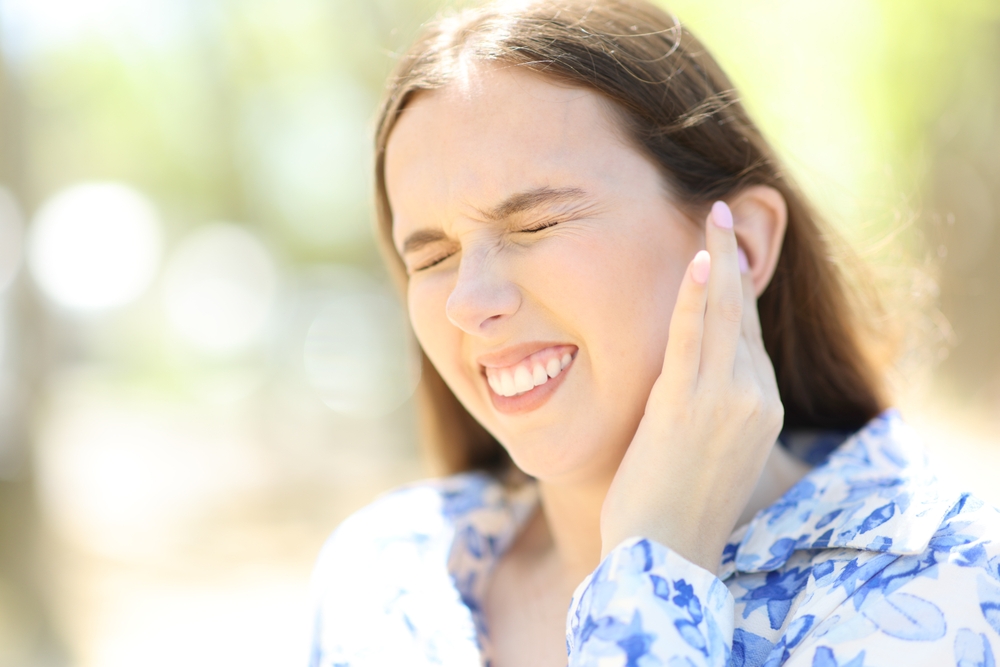 For the nearly 25 million Americans living with tinnitus, the summer months can sometimes bring unexpected changes in how their condition feels. Some notice their tinnitus getting louder, more persistent, or more distracting when the weather heats up. But why does this happen?
For the nearly 25 million Americans living with tinnitus, the summer months can sometimes bring unexpected changes in how their condition feels. Some notice their tinnitus getting louder, more persistent, or more distracting when the weather heats up. But why does this happen?
At El Dorado Hearing, we hear from patients every summer asking the same question: “Is my tinnitus worse because of the heat?” The answer isn’t always simple, but science and clinical experience suggest there are several valid reasons why tinnitus and summer heat may be connected.
What Is Tinnitus?
Tinnitus is the perception of sound without an external source. It’s often described as ringing, buzzing, hissing, or even a high-pitched whine in the ears. Tinnitus can be constant or intermittent and may occur in one or both ears. It isn’t a disease itself, but a symptom of an underlying issue, such as hearing loss, noise exposure, ear injury, or circulatory problems.
While the condition is often chronic, the intensity of tinnitus can vary based on environmental, emotional, and physical factors, including temperature and humidity.
How Summer Heat Affects the Body, and the Ears
High temperatures affect many body systems. When you’re exposed to intense heat, your cardiovascular system works harder, blood vessels expand, and body temperature rises. These physiological changes can impact blood flow to the inner ear, which plays a key role in balance and auditory function.
Some people experience a noticeable change in their tinnitus when:
- The weather is extremely hot or humid
- They are dehydrated or overheated
- They have prolonged sun exposure without rest
Additionally, heat can exacerbate stress, fatigue, and dehydration, all of which are known triggers for increased tinnitus perception.
Summer-Specific Triggers That May Worsen Tinnitus
Aside from heat itself, several environmental and behavioral factors common in the summer months can indirectly affect tinnitus symptoms.
- Dehydration:
When you’re dehydrated, blood flow to your inner ear may become restricted, which can aggravate tinnitus. Many people don’t drink enough water during summer, especially in dry regions like Arizona. - Increased Caffeine and Alcohol Intake:
Iced coffee, energy drinks, and summer cocktails may seem harmless, but they can dehydrate the body and increase tinnitus intensity. Caffeine and alcohol both impact blood pressure and circulation, making tinnitus more noticeable for some individuals. - Loud Outdoor Activities:
Fireworks, live music events, and yard equipment are summer staples, but they often exceed safe noise levels. Even a short burst of sound over 85 decibels can trigger a tinnitus flare-up, especially if you already have hearing loss. - Medication Interactions:
Certain over-the-counter medications commonly used in summer, like antihistamines for allergies or aspirin for sunburn-related discomfort, can be ototoxic, meaning they may negatively impact the ear or exacerbate tinnitus in sensitive individuals.
Stress, Sleep, and Seasonal Routines
Summer heat often disrupts sleep patterns. Poor sleep is closely tied to increased tinnitus distress. Additionally, the pressure to stay active, manage children home from school, or travel during the summer can elevate stress levels, which in turn can heighten your awareness of tinnitus.
The emotional perception of tinnitus often plays a larger role than the volume of the sound itself. When you’re tired, overwhelmed, or stressed, the brain has a harder time filtering out internal sounds, and tinnitus can feel more intrusive.
Managing Tinnitus During the Summer
Although tinnitus can be more noticeable during hot weather, there are several ways to manage symptoms and reduce discomfort. Staying hydrated, getting adequate rest, and avoiding prolonged exposure to heat can help regulate your body’s response. Managing stress through mindfulness or deep breathing exercises may also ease the perception of tinnitus.
If you use hearing aids, be sure they are functioning properly in the heat. Modern hearing aids can often be programmed with tinnitus masking features, like white noise or soft ocean sounds, that help mask internal ringing. These tools can be particularly helpful during seasonal flare-ups.
Additionally, it’s a good idea to avoid sudden exposure to loud environments and carry ear protection if you’re planning to attend a concert or fireworks show. Protecting your ears now can prevent long-term damage that might worsen tinnitus.
When to See a Hearing Professional
If your tinnitus becomes more intense or starts interfering with daily activities, regardless of the season, it’s important to seek an evaluation. Tinnitus can sometimes signal underlying hearing loss or other treatable medical issues.
At El Dorado Hearing, we offer comprehensive tinnitus evaluations, hearing tests, and support for people who are struggling to manage tinnitus year-round. Whether you need custom hearing aid adjustments, tinnitus sound therapy, or just professional advice on managing symptoms in summer heat, we’re here to help.
Let the Sounds of Summer Stay Enjoyable
Tinnitus may not go away entirely, but it doesn’t have to dominate your summer. By understanding how heat, hydration, and stress contribute to your symptoms, you can take control and get back to enjoying the season.
If you or someone you love is noticing louder ringing or buzzing in the ears during summer months, don’t wait. A hearing consultation can bring clarity, comfort, and solutions.
Schedule your tinnitus evaluation today with Eldorado Hearing at eldoradohearing.com or call to speak with a specialist.
We’re here to help you hear better, every season of the year.



Leave a Reply